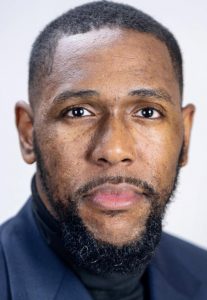If you were to survey the most significant decades in human history, the late 1950s to late 1960s undoubtedly would be at the top of the list because of the Civil Rights Movement, better known as the Southern Black Freedom Movement, to end the centuries of legalized apartheid making African Americans second-class citizens in the United States.

Darrell Hamilton II
Martin Luther King is lifted up as the figurehead of this movement because of his commitment to achieve racial equality and freedom. A commitment that ultimately cost him his life. However, King’s leadership could not have existed as we celebrate it today without the leadership, support and sacrifices of countless people (Black/white, male/female, queer/straight, Jewish/Muslim, poor/wealthy, young/old) who put their bodies on the line to advance equality and freedom through sit-ins, boycotts, marches and protests to arrest the world’s attention and afflict the conscious of the nation.
Countless numbers of people coalesced to overcome the greatest culprit to true freedom and justice, which was the silence of the majority of American people. Silence that allowed the plight of African Americans to persist. The silence of those who would call you friend in private but not raise a voice to support you in public. The silence of those who had a louder critique of civil disobedience as a legitimate form of resistance than for the policies and beliefs that gave reasons for civil disobedience to begin with.
It was the silent church that traded its birthright as a bastion of justice and hope for the bowl of soup of tacit complicity to the three evils of racism, capitalism and militarism. Moreover, it was silence that sustained life in the violent actions, violent rhetoric and violent policies that kept African Americans and all marginalized underfoot and served to lead a nation to destruction and ruin.
“The silent church traded its birthright as a bastion of justice and hope for the bowl of soup of tacit complicity to the three evils of racism, capitalism and militarism.”
Silence, then, as now, serves as the greatest enemy to overcoming the iniquities of the world and bringing about King’s dream of beloved community.
In what would become known as “Letter from Birmingham Jail,” King responded to a group of Christian and Jewish clergy in Alabama who, in a separate letter, criticized the efforts of the Civil Rights Movement and accused King of leading an effort that was “untimely” and “unwise.” In one of the most famous passages of the letter, King wrote:
I must make two honest confessions to you, my Christian and Jewish brothers. First, I must confess that over the past few years I have been gravely disappointed with the white moderate. I have almost reached the regrettable conclusion that the Negro’s great stumbling block in his stride toward freedom is not the White Citizen’s Counciler or the Ku Klux Klanner, but the white moderate who is more devoted to “order” than to justice; who prefers a negative peace which is the absence of tension to a positive peace which is the presence of justice; who constantly says “I agree with you in the goal you seek, but I can’t agree with your methods of direst action”; who paternalistically feels that he can set the timetable for another man’s freedom; who lives by the myth of time and who constantly advises the Negro to wait until a “more convenient season.” Shallow understanding from people of good will is more frustrating than absolute misunderstanding from people of ill will. Lukewarm acceptance is much more bewildering than outright rejection.”
If we were to replace the word “Negro” in King’s letter for “Palestinian,” more than 100 days since the violence began in Gaza that has killed more than 20,000 Palestinians, it would appear the same critique is applicable to moderates who remain the great stumbling block in the stride toward freedom.
Moderates and progressives — whether they are white, Black, male, female, queer, straight, Jewish, Muslim, poor, rich, young, or old — who stand in pulpits all over the world celebrating Dr. King as a leader, dreamer and champion of peace, but will not call for a ceasefire in Gaza or an end to the occupation of the West Bank.
Moderates as well as progressives, as King wrote, who are more devoted to order than to justice; who prefer a negative peace as the absence of tension than the positive peace which is the presence of justice.
“Moderates and progressives still, after 56 years since King’s assassination, choose to commemorate a mythical King opposed to the real King.”
Moreover, who repeatedly require Palestinians to justify their humanity against 76 years of Western imperialism; who demand that Palestinians defend the righteousness of their indignation in the face of Christian and Jewish criticism and resistance; who paternalistically tell those in exile to accept a peace agreement that would give them only a fraction of what was originally theirs and had no obligation to negotiate; who choose silence rather than risk alienating their relationships with family, friends and institutions of power; who feign friendship in the face of the marginalized while remaining complicit in their persecution.
Moderates and progressives who still, after 56 years since King’s assassination, choose to commemorate a mythical King opposed to the real King who was raised to be a third-generation preacher, but whom God called to be a prophet. The real King who at the time of his death had a public disapproval rating of nearly 75%. The real King who the government of the United States decided would be better silenced — and on April 4, 1968, he was silenced not only by an assassin’s bullet but also every year since through the bastardized telling of his legacy.
But in every generation God raises up a prophet from among the people and says, “I will put my words in the mouth of the prophet, who shall speak to them everything that I command” (Deuteronomy 18:18). And if we properly wish to honor Martin Luther King, we cannot allow ourselves to be silent on the necessary moral issues of the day.
King once prophesied, “In the end, we will remember not the words of our enemies, but the silence of our friends.” And King, the great prophet of God, speaks to us from the streets of heaven, and he is calling us to get out from inside the constricts of our institutions, sentiments and fears and respond to the voice of God, as he once did, to stand up for righteousness. Stand up for justice. Stand up for truth. And know that God will be with us even to the end of the world.
Therefore, if we wish to consider ourselves friends of justice, righteousness and truth, then we must refuse to be silent and speak the words God commands to be true friends to God’s people.
Darrell Hamilton II serves as administrative pastor at First Baptist Church of Jamaica Plain, Mass., and as Protestant chaplain at Babson College in Wellesley, Mass. He is an ordained Baptist minister and graduate of Wake Forest School of Divinity. His ministry and leadership are focused on advancing diversity, inclusion and advocacy for the vulnerable and marginalized to inspire greater justice and love for all people.


